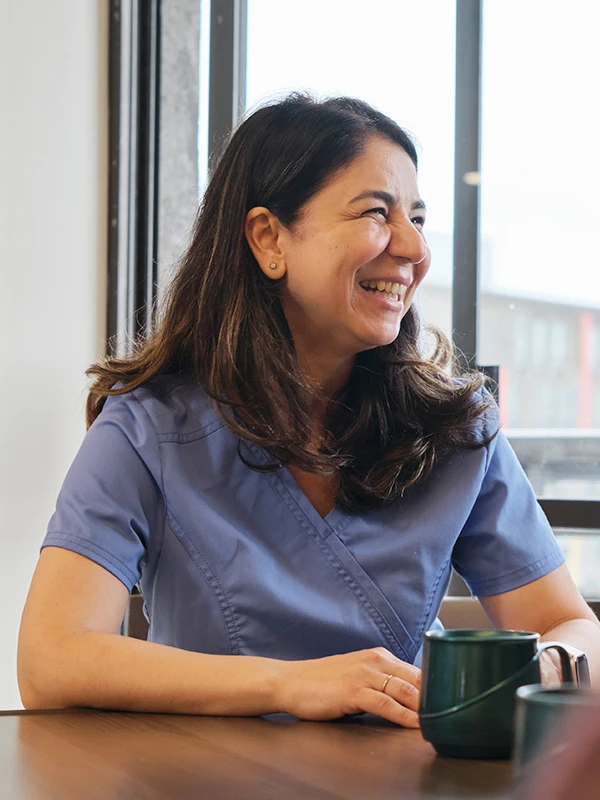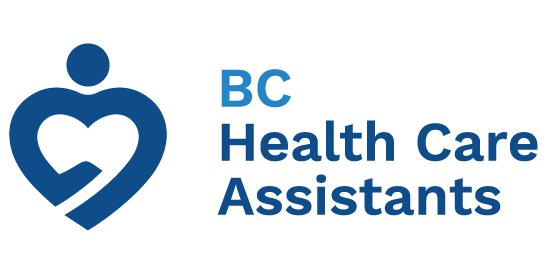General HCA Information

What is a Health Care Assistant?
Health Care Assistants (also referred to as HCAs) are direct care providers who are important and respected members of British Columbia’s healthcare team. They play a critical role in helping BC residents receive quality, person-centred care. HCAs provide personal care assistance and services in various healthcare settings, including acute care, assisted living, group homes, continuing care, and community care. Learn more about Health Care Assistants.
Pathways to Registration
There are several Registration Pathways available depending on your experience and background.
You may consider completing a full HCA program at one of the recognized post-secondary institutions. At approximately seven months, these HCA programs are a good return on your investment and may even offer flexible delivery options during weekends and evenings and online.

BC Care Aide & Community Health Worker Registry
To be eligible to work as a HCA in any publicly funded healthcare setting in BC, applicants must be registered with the BC Care Aide & Community Health Worker Registry.
The role and mandate of the Registry is:
- To protect vulnerable patients, residents and clients;
- To establish and improve standards of care in the care aide and community health worker occupations; and
- To promote professional development for care aides and community health workers, and to assist these workers in identifying career opportunities.
Financial Supports
We offer several financial support options that can help you with costs associated with the registration pathway you choose.
- HCA Bursary Program (HCA Competency Assessment & Remedial Education)
- HCAP Pre-Requisite Stipend
- Expedited Pathway Stipend
Depending on your situation, browse the pages below to view the different financial supports available outside of our services.
Employment
The demand for Health Care Assistants continues to grow as an important and necessary role in delivering health care in BC, making it a great career choice.
Browse employment opportunities as a Health Care Assistant (or equivalent role), in both public and private healthcare sectors on our Employment page.
Health Care Assistants work in a variety of healthcare settings including hospitals, continuing care and assisted-living settings, and in the community providing home care.
HCAs are responsible for assisting clients with their mobility, activities of daily living, and personal care. They observe and monitor their clients, and are responsible for completing records and reporting changes and unsafe conditions to their supervisor. HCAs are supervised by nurses and other regulated health care professionals (e.g., doctors, nurse practitioners). Learn more about what HCAs do here.
Acute/Hospital Facilities
Hospital Porter, Dialysis Technician, Unit Clerk, Housekeeper, Screener/Greeter*
Long-Term Care Homes / Assisted Living Residences
Housekeeper, Food Server, Laundry Attendant, Dietary Aide, Cook, Health Care Support Worker, Screener/Greeter*
Community-based
Private in-home Caregiver, Home Health Companion, Health Care Support Worker
Other
Community Support Worker, Mental Health Worker, Doula
Resources
Unions
*Please note that this list is not an exhaustive list. HCAs should confirm their union representation and reach out accordingly.
BC General Employees’ Union (BCGEU)
United Food and Commercial Workers Union (UFCW)
Hospital Employees’ Union (HEU)
Canadian Union of Public Employees (CUPE)
Health Sciences Association (HSA)
Unity and Strength for Workers (USW)
Mental Health & Wellness for Healthcare Workers
Care for Caregivers is a mental health and wellness resource hub for continuing care workers. Whether you’re looking for up-to-date credible information to ease your mind, a free workshop to learn about resiliency, or quick daily coping tips, it’s all on one website.
Health & Safety
SafeCareBC is a not-for-profit society working to ensure injury-free, safe working conditions for long-term care workers in BC. Their website provides resources for injury prevention and safety training.
WorkSafeBC offers healthcare injury prevention resources by topic (chemical and physical hazards, dementia, general ergonomics, general safety, infectious disease, patient handling, slips and trips, violence) and sector (home care, social services).

Violence Prevention
The Provincial Violence Prevention Curriculum (PVPC) was developed in 2010 to fill a need for effective, recommended, and provincially recognized violence prevention education for all British Columbia healthcare workers across a range of care settings, including affiliate organizations. The PVPC was refined and updated in 2015 to align with trauma-informed practice, dementia care, and pediatric care principles.
WorkSafeBC, Dementia: Understanding Risks and Preventing Violence
This resource provides information about how clinical care approaches and interventions can prevent or minimize the risk of injury to workers when caring for people with dementia.
General FAQ
What is a Health Care Assistant?
Health Care Assistants (also referred to as HCAs) are direct care providers who are important and respected members of British Columbia’s healthcare team. They play a critical role in helping BC residents receive quality, person-centered care. HCAs provide personal care assistance and services in various healthcare settings, including acute care, assisted living, group homes, continuing care, and community care. Learn more here.
What does a Health Care Assistant do?
A Health Care Assistant provides direct personal care assistance and support to various clients, including older adults, people living with disabilities and/or chronic illnesses, and clients receiving palliative care.
Health Care Assistants provide essential and important daily living support and comfort to patients, clients, and residents. They assist with bathing, grooming, dressing, toileting, and other personal hygiene activities.
HCAs provide personal care to both men and women, and they may help patients/clients with nutrition, mobility, and other daily activities as needed.
Are there other titles that Health Care Assistants are typically referred to as?
Health Care Assistants may have many different titles, such as Care Aides, Resident Care Attendants, Community Health Workers, Home Support Workers, and Patient Care Attendants. No matter what titles are used, Health Care Assistants work with a common goal to provide the highest quality of essential care possible to their clients or residents.
What are some characteristics that I must have to become a good Health Care Assistant?
To work in this field, you should have good interpersonal skills and a caring, compassionate nature. Health Care Assistants typically have a genuine desire to help others.
HCAs require patience and understanding because their clients may have cognitive, mental, or emotional health challenges, in addition to physical limitations.
The ability to handle stressful situations may be needed, with effective communication and good problem-solving skills. HCAs must be efficient and accurate yet sensitive to the needs of clients.
Where do Health Care Assistants work?
Health Care Assistants work in various healthcare settings, including hospitals, continuing care and assisted-living settings, and in the community providing home care.
HCAs work collaboratively with nursing professionals and other members of the overall healthcare team.
What are the differences in the activities of working in a community setting (home support or assisted-living) versus multi-level/complex care (continuing care home) versus acute care (hospital)?
Health Care Assistants working in home support or assisted-living settings support clients who require some assistance to live independently, but may not require 24-hour nursing care. While HCAs working in continuing care homes or hospitals work under the direct supervision of a health care professional, HCAs working in community settings often work more independently. In addition to assisting clients with personal care activities, HCAs working in community settings may perform household management tasks and duties delegated to them by a nurse in accordance with employer policy.
Education FAQ
What kind of education do I need to become a Health Care Assistant?
To become a registered Health Care Assistant in BC, you need to complete an education program recognized by the BC Care Aide and Community Health Worker Registry. Recognized HCA programs follow the BC HCA Provincial Curriculum. This training prepares graduates to provide person-centred care and support to clients experiencing physical, mental, and/or cognitive health challenges, or with developmental disabilities in various settings.
Students take courses focused on values and principles of healthcare provision, teamwork and collaboration, health conditions, communication, safety, and skills required to provide personal care and assistance within the HCA role. They also can apply knowledge, skills, and attitudes in the practice setting by completing practice education placements in care homes and community settings.
See the list of recognized BC HCA programs here.
Where can I search for available training programs to enroll to become a Health Care Assistant?
To become a registered Health Care Assistant in British Columbia, you must complete a recognized Health Care Assistant program using the provincial curriculum. Click here to view a list of recognized health care assistant education programs in British Columbia.
You can contact colleges to obtain registration requirements, course length, format, and tuition costs. All HCA programs will provide clinical placements to help students gain hands-on experience.
Are there Health Care Assistant training programs that are located close to where I live?
Use our interactive map that will help you find a Health Care Assistant education program that is conveniently located in your area. Click here to check it out.
How long is the Health Care Assistant education program for students?
Is there financial support to assist with completing BC’s Health Care Assistant educational programs?
Yes, you can access different financial assistance options depending on your eligibility. See the Financial Support sections for each registration category on our home page for more information.
Are there dual credit options that offer Health Care Assistant training?
Yes, dual credit options are offered in some high schools throughout BC, allowing you to work toward an HCA credential while still in high school. Dual credit experiences enable you to enroll in post-secondary courses and earn credits toward your high school diploma and post-secondary credits at the same time.
For more information on dual credit options, click here.
Registration FAQ
Who is eligible to apply to the Registry?
All Health Care Assistants (HCA’s) seeking employment in a publicly funded healthcare setting in BC need to apply for registration with BC Care Aide and Community Health Worker Registry.
Why register?
To be eligible to work in a publicly funded healthcare setting in BC, Health Care Assistants must be registered with the BC Care Aide and Community Health Worker Registry.
What is the purpose of the Registry?
By creating a Registry for all care aides and community health workers in BC, the Ministry of Health establishes and improves standards of care.
The Registry was also created to serve and protect vulnerable patients, residents, and clients receiving care from Health Care Assistants in the province.
Who is eligible to be on the Registry?
- Graduates of Health Care Assistant programs in BC
- Graduates of Health Care Assistant programs in Canada (outside of BC)
- Licensed Practical Nurses, Registered Nurses, and Registered Psychiatric Nurses who are licensed to practice in Canada. (Nurses educated outside of Canada and not licensed to practice in Canada must apply as internationally educated health care professionals.)
- Students enrolled in nursing programs in Canada
- Internationally educated health care professionals (IEHCPs)
How much does it cost to register?
Who can access the Registry?
Publicly funded employers wanting to hire registered Health Care Assistants.
I am a health care assistant employed in a private facility in BC. I want to register. Can I?
Yes, with proof of successful completion of a recognized training program for Health Care Assistants. If your education credential is more than 3 years old, you will be asked to provide a resume outlining your recent and relevant health care assistant work experience. Depending on your situation, you may be required to take a HCA competency evaluation.
How do I know if my position is included in the scope of the Registry?
What are the advantages of registering as a Health Care Assistant for internationally educated nurses?
Working as an HCA, you will gain valuable Canadian healthcare experience and keep your skills in practice. You will also have access to a comprehensive salary and benefits package while building seniority with an employer and accumulate work hours to improve your eligibility for transitional education programs.
I’m an LPN, and I work full-time (or part-time) as a Health Care Assistant. Am I eligible to register?
Yes, anyone classified and working as either a full-time or part-time Health Care Assistant is eligible to apply for registration by providing the requested credentials.
Employment FAQ
How many Health Care Assistants are currently registered in BC?
As of December 31, 2024, 56,223 Health Care Assistants (HCA) hold active registration status with the BC Care Aide & Community Health Worker Registry (the Registry).
Will I be able to find a job? Are there HCA job opportunities in the future of the healthcare industry?
The demand for Health Care Assistants continues to grow as an important and necessary role in delivering health care in BC, making it a great career choice.
As our society ages, more people will require the support of healthcare workers to sustain their personal health needs.
How much do Health Care Assistants get paid?
According to information from the Health Employers Association of BC, the starting hourly wage of a Health Care Assistant working in a publicly funded setting can range from $27.92 to $29.83 (wage as of April 1, 2024), depending on the employment sector. As a full-time or part-time employee, you would have access to a comprehensive benefits package and a benefit pension plan through the Municipal Pension Plan. Most graduates usually start with casual or part-time employment and work up to full-time status gradually.
Will there be Health Care Assistant job opportunities in my local community?
There is a strong demand for Health Care Assistants across the province, in both urban centres and rural communities.
Visit our Employment page for more information about job opportunities.
What are the typical work hours for Health Care Assistants? Are there full-time and part-time options? Are Health Care Assistants required to work weekends, holiday shifts? Are they expected to perform on-call duty?
Health Care Assistants may work full-time or part-time hours, or on a call-in (casual) basis. They can apply for positions that are permanent, temporary, or casual. Shift schedules may include a combination of days, evenings, nights, weekends, and holidays, as well as on-call duty.
Are the typical daily work activities of a Health Care Assistant physically demanding?
Health Care Assistants are on their feet for much of their workday. Many HCAs work in environments that require varying levels of physical exertion. They may assist clients with mobility, positioning, lifts, and transfers, use and move equipment, and provide personal care.
Do Health Care Assistants in BC have to be fluent in English?
Health Care Assistants must read, write, speak, and understand the English language to follow directions and communicate effectively with clients, family members, and the healthcare team. Please review the English Language Competency Requirements.
If you can’t find the answer to what you are looking for, Contact Us
Choose a Career in Providing Care
Site Map
Privacy Policy
Terms Of Use
Contact Us
